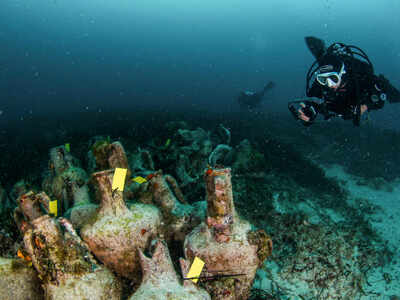
STENI VALLA (GREECE): Near the northern Greek island of Alonissos lies a remarkable ancient shipwreck: the remains of a massive cargo ship that changed archaeologists’ understanding of shipbuilding in antiquity.
This find is to become the first ancient shipwreck to be made accessible to the public in Greece, including to recreational divers.
Greece’s rich underwater heritage has long been hidden from view, off-limits to all but a select few, mainly archaeologists. Scuba diving was banned throughout the country except in a few specific locations until 2005, for fear that divers might loot the countless antiquities that still lie scattered on the country’s seabed.
Divers will be able to tour certain shipwrecks and non-divers will experience the sites through virtual reality in information centers on land.
The first of these sites is the Peristera shipwreck, named for the uninhabited Greek island opposite Alonissos where it was discovered in the early 1990s. The cargo ship was laden with thousands of amphoras, or vases, probably containing wine, when it sank in the late 5th century BC.
All that survives is the cargo, the exposed parts of the wooden ship having long since rotted away. But the sight is spectacular.
“It is very impressive. Even I, who have been working for years in underwater archaeology, the first time I dived on this wreck I was truly impressed,” said Dimitris Kourkoumelis, the lead archaeologist on the project.
The wreck still holds mysteries. Only a small part has been excavated, and experts have yet to determine how or why it sank.
Three other shipwrecks in the Pagasitic Gulf are also included in the project, which is part of a European Commission-funded Blue-Med programme, that plans to expand the project to Italy and Croatia. More test dives will be held this summer and next year, with hopes of fully opening the sites to recreational diving in early 2021.
This find is to become the first ancient shipwreck to be made accessible to the public in Greece, including to recreational divers.
Greece’s rich underwater heritage has long been hidden from view, off-limits to all but a select few, mainly archaeologists. Scuba diving was banned throughout the country except in a few specific locations until 2005, for fear that divers might loot the countless antiquities that still lie scattered on the country’s seabed.
Divers will be able to tour certain shipwrecks and non-divers will experience the sites through virtual reality in information centers on land.
The first of these sites is the Peristera shipwreck, named for the uninhabited Greek island opposite Alonissos where it was discovered in the early 1990s. The cargo ship was laden with thousands of amphoras, or vases, probably containing wine, when it sank in the late 5th century BC.
All that survives is the cargo, the exposed parts of the wooden ship having long since rotted away. But the sight is spectacular.
“It is very impressive. Even I, who have been working for years in underwater archaeology, the first time I dived on this wreck I was truly impressed,” said Dimitris Kourkoumelis, the lead archaeologist on the project.
The wreck still holds mysteries. Only a small part has been excavated, and experts have yet to determine how or why it sank.
Three other shipwrecks in the Pagasitic Gulf are also included in the project, which is part of a European Commission-funded Blue-Med programme, that plans to expand the project to Italy and Croatia. More test dives will be held this summer and next year, with hopes of fully opening the sites to recreational diving in early 2021.
Download The Times of India News App for Latest World News.
Making sense of 2019 #ElectionswithtimesView Full Coveragemore from times of india news
Elections 2019

Trending Topics
LATEST VIDEOS
More from TOI
Navbharat Times
Featured Today in Travel
Get the app









